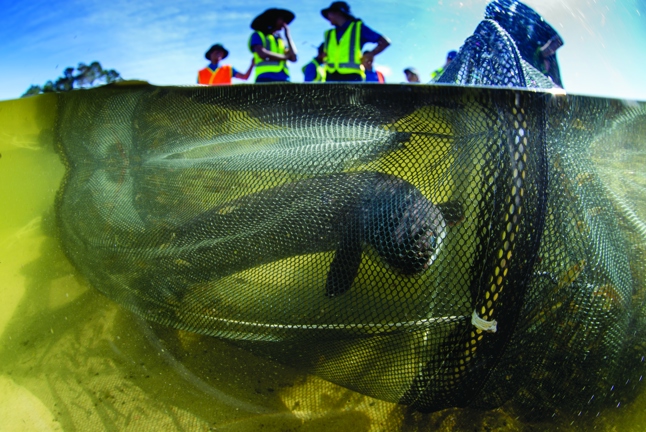Story
Freshwater Improvement Fund helps eradicate aggressive aquatic weed
A New Zealand-first operation saw an entire Northland dune lake treated with a selective herbicide in September of this year. Northland Regional Council staff are cautiously optimistic that the operation has been successful in helping to eradicate an unwanted oxygen weed, Largarosiphon major.
Lagarosiphon major (an aquatic pest plant native to South Africa) smothers native plants, affects food and shelter for fish and other wildlife, clogs waterways and can make recreational activities like boating and swimming difficult.
The aggressive invasive plant was causing issues at 56-hectare Lake Ngatu, northwest of Awanui, one of Northland’s precious dune lakes. New Zealand is a global hotspot for dune lakes – which typically form in the hollows of wind-sculpted dunes and stabilise over time – and Northland has one of the most significant concentrations in the country.
Biodiversity Advisor Dylan Smith says after thorough research, consultation and monitoring, it was decided that a full-lake treatment (using roughly 7000 litres of the herbicide called Aquathol K a derivative of Endothall) would be the most effective way of eradicating Lagarosiphon major from Ngatu.
Targeting the lake’s oxygen weed problem this way was a national first as the Environmental Protection Agency (EPA) only allows quarter lake treatments per time to avoid the potential for large volumes of dead pest plants lowering oxygen levels in the lake as they rot. (In this case, the risk was much less likely because there wasn’t so much weed it would have caused big changes to the lake’s water chemistry once it started dying). Northland Regional Council was successful in gaining permission from EPA to treat the whole lake at once.
The operation was undertaken by airboat through a Rotorua-based contractor in September, with involvement from Northland Regional Council, the Department of Conservation and Ngai Takoto Kaitiaki Rangers.
The public was informed of the operation, and all involved were present to answer questions and ensure no one entered the water as the lake was closed for swimming for 24 hours after it was treated. The lake was also closed for stock and human drinking water for 14 days following the operation.
Mr Smith says Endothall is a ‘highly selective’ herbicide that only targets a few select species, including Lagarosiphon major (African oxygen weed), with research showing it could potentially eradicate it even in very low doses.
It does this by targeting the root crown of the plants and preventing regeneration with only minimal effect on our native flora and no known effects on lake wildlife.
A dive survey 15 days after the operation to fully ensure the herbicide had not impacted other plants and animals showed the native plant community was thriving but the pest plant had died off significantly. “Essentially, the smothering oxygen weed beds had collapsed therefore, the operation appears to be a success," he says.
The operation is part of NRC's commitment to proactively protect freshwater against aquatic pest plants and future threats, says NRC’s Deputy Chair Justin Blaikie, who also heads the council’s Water and Land Working Party. "The success at Lake Ngatu builds on our knowledge of the issue, and it means we have a solution to the problem of Lagarosiphon major here and anywhere else it's found," he says.
The project works in partnership with mana whenua iwi and hapu to ensure the cultural values and aspirations of mana whenua are considered and included in the planning and delivery of the project.
The Ngatu operation was carried out as part of a shared fund with the Ministry for the Environment from their Freshwater Improvement Fund (FIF) to improve the water quality of some of Northland's dune lakes. Both Northland Regional Council and the Ministry for the Environment provided $750,000.
The fund commits $100 million over a decade to improve the management of New Zealand's lakes, rivers, streams, groundwater and wetlands. Councillor Blaikie says given almost all freshwater lakes in the North Island are dune lakes “it's important we protect them both for ecological reasons and to maintain the mauri (life force) for iwi with whakapapa connections to them”.

Lake Ngatu is home to a number of important native species including the longfin tuna (eel).
Photo credit: Irene Middleton, Seacologynz.com
